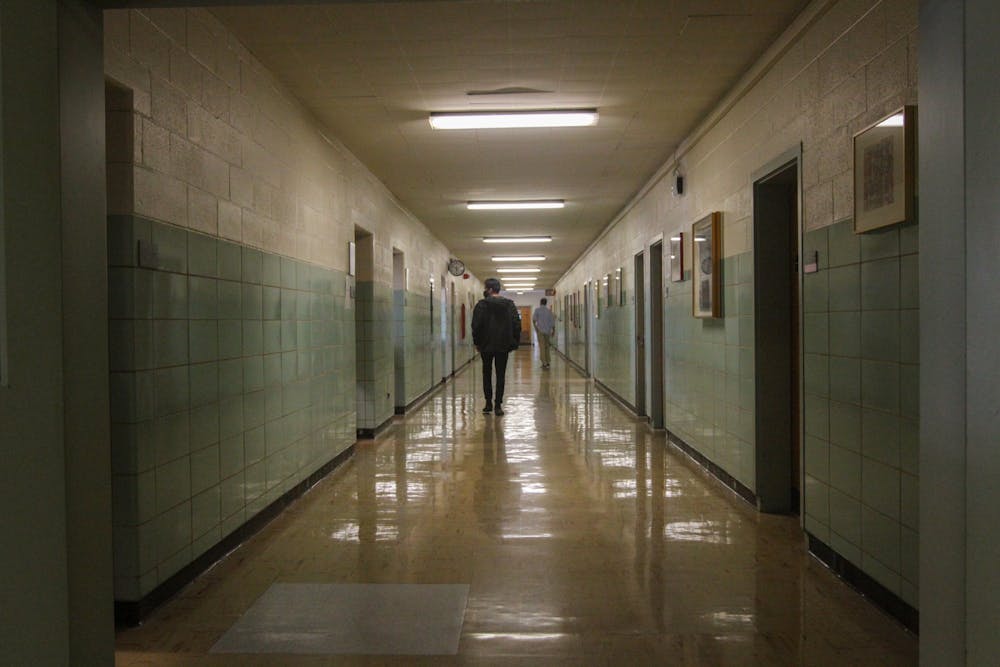
A hallway in David Rittenhouse Laboratory on Oct. 21.
Credit: Matthew SchwartzBroken heating on the fourth floor of David Rittenhouse Laboratory forced professors and graduate students to work in cold temperatures last week.
Svetlana Makarova and Maximilien Péroux, both math professors with offices in the 4C wing of DRL, said the heating in their offices stopped working on Nov. 3 — as temperatures outside reached a low of 37 degrees. The issue was resolved on Monday, Facilities & Real Estate Services Operations and Maintenance Executive Director Faramarz Vakilizadeh wrote in an email to The Daily Pennsylvanian.
“Due to a heat timer programming issue with the perimeter steam radiator system, some rooms were not reaching the desired temperature,” Vakilizadeh said.
Makarova said that administrative staff in the Math Department entered her office on Tuesday and attempted to turn up the heating system to the second-highest level. The heat didn’t turn on, leading Makarova to email the DRL building administration. DRL is located at 33rd and Walnut streets and houses the Physics and Math departments, as well as several laboratories.
At 3 p.m. Friday — when it was 54 degrees outside — Makarova’s portable thermostat read 63 degrees. The World Health Organization, in its standards for healthy indoor temperatures, recommends a minimum of 64.4 degrees. Makarova said that she ended up wearing gloves to keep her hands warm, and that the Math Department lent her a space heater.
“With lower temperatures, my fingers freeze and I can't move them as freely,” Makarova said.
Makarova and Péroux both decided to work from home as a result of the heating issue. Makarova stayed home on Wednesday, while Péroux, who does not teach classes on Thursdays, chose to stay home on that day.
“There’s no reason for me to come over and freeze,” Péroux said.
While Makarova confirmed that the heating returned to her office on Nov. 9, one week after it stopped working, others who work in DRL said that this is not the first time heating has been an issue.
Jiaming Xia, a mathematics Ph.D. candidate in the School of Arts and Sciences, said she has experienced faulty heating in parts of the third and fourth floors of DRL since her first year at Penn in 2017.
Xia said that the difference between the reliable heating in undergraduate classrooms and the faulty heating in “shabby” graduate offices showed a contrast between the resources Penn dedicates to undergraduate and graduate students.
Administrators previously cited a lack of funding as the reason why a 2013 plan to renovate DRL did not move forward. DRL was built in 1954.
“Sometimes it's working. Sometimes it's not,” Xia said. “It’s just something really random, and it's hard to handle.”
Math professor Ryan Hynd, who works in the 4N wing, said that the heater in his office has not worked for a “big part” of the time he has worked at Penn — since 2012.
While Xia and Hynd said that temperatures inside DRL were still warmer than outside, they both said that it can be uncomfortably cold working in their offices for prolonged periods of time. For years, both have taken steps to stay warm in their offices during the winter.
“I do what I got to do to stay warm, get the work done, and then get home,” Hynd said.
Xia said that one of her friends bought a portable space heater off of Amazon to deal with the cold indoor temperatures and shared it with other graduate students, and Hynd said he usually keeps an extra sweatshirt in his office.
“During the winters, we just gather around that small heater. It’s really funny,” Xia said.
Hynd said that building maintenance staff have addressed previous heating issues with repairs such as resealing windows that were letting in cold air. However, returning to his office in person this fall after a year of working remotely made him re-evaluate his working conditions.
“I work for an Ivy League institution, as a tenured professor, and I don't really have adequate heating," he said. "It doesn't really add up.”
The Daily Pennsylvanian is an independent, student-run newspaper. Please consider making a donation to support the coverage that shapes the University. Your generosity ensures a future of strong journalism at Penn.
Donate







